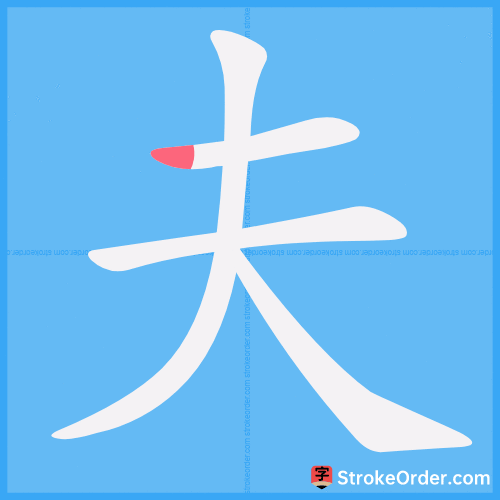夫 Stroke Order
Animated Stroke Order of 夫

Stroke Order Diagrams for 夫

Step-by-Step Handwriting Guide for 夫

Learn to Write Chinese Characters with Video Tutorials
Watch the video of writing the Chinese character "夫", learn the correct stroke order (笔顺) of the character "夫", and master the standard way of writing the character "夫".
Free Printable Handwriting Practice with Stroke Order: 夫
Printable Writing Practice Worksheet of "夫" in Portrait Orientation (Tian Zi Ge)

Printable Writing Practice Worksheet of "夫" in Landscape Orientation (Tian Zi Ge)

Information of 夫
Pinyin
fū、 fú
Radical
大
Strokes
4 strokes
Usage
★★★★★
Definition
porter, husband / man
夫 [fū]
名
1. In ancient times, it referred to an adult male.
2. In ancient times, it referred to a person performing manual labor.
3. In ancient times:
1) A term of address for scholars.
2) A title for teachers.
3) A term used by a wife to refer to her husband.
4) A term for someone who reads ancient texts and has outdated thoughts.
4. A person who has formed a partnership with a wife.
1. In ancient times, it referred to an adult male: fisherman, farmer, a person with undue courage.
2. In ancient times, it referred to a person performing manual labor: laborer.
3. In ancient times:
1) A term of address for scholars.
2) A title for teachers.
3) A term used by a wife to refer to her husband.
4) A term for someone who reads ancient texts and has outdated thoughts.
4. A person who has formed a partnership with a wife: husband, wife.
【Original Meaning】: The general term for an adult male.
【Character Formation】: Pictographic. The oracle bone inscription resembles a standing person (big), and the top “one” indicates a hairpin in the hair, meaning an adult male or husband. In ancient times, a man was considered a husband only after tying up his hair and wearing a cap, hence the addition of “one” as a symbol.
1. Same as the original meaning ([En.] man)
2. A woman's official partner ([En.] husband)
3. Formerly referred to a person engaged in manual labor ([En.] working man)
4. A true man; an elegant title for males ([En.] true man)
5. Sword sleeve ([En.] sleeve of a sword)
6. Also refers to instep ([En.] instep)
副
1. Also read "复". Again; once more ([En.] again; once more)
2. See also fú
文言发语词。
1. The term can be a discourse marker in classical Chinese.
2. A classical Chinese particle.
3. A demonstrative pronoun equivalent to "this" or "that."
代
1. “夫” can be borrowed for “彼”。 He, she, it, they ([En.] he, she, it, they) — third-person pronoun.
2. That, those ([En.] that, those) — indicating distant reference.
3. This, these ([En.] this, these) — indicating near reference.
4. All; everyone. Equivalent to “凡” ([En.] all)
助
1. Used at the beginning of a sentence to indicate a prompt.
2. Used in the middle of a sentence to soften the tone.
3. Used at the end of a noun to indicate exclamation.
4. See also fū
代
1. “夫” can be borrowed for “彼”。 He, she, it, they ([En.] he, she, it, they) — third-person pronoun.
Example: "使夫往而学焉" ("Let him go and learn")
2. That, those ([En.] that, those) — indicating distant reference.
Reference:
1) "故为之说,以俟夫观人风者得焉。" ("Thus, I speak to wait for those who observe the manner of people.")
2) "余亦悔其随之而不得极夫游之乐也。" ("I also regret that following it I could not fully enjoy the pleasure of this journey.")
3. This, these ([En.] this, these) — indicating near reference.
Reference:
1) "夫人不言,言必有中。" ("When a person speaks, their words must have substance.")
4. All; everyone. Equivalent to “凡” ([En.] all)
Reference:
1) "知保抱携持厥妇子。" ("Who knows to protect and carry his wife and children.")
助
1. Used at the beginning of a sentence to indicate a prompt.
Reference:
1) "夫秦有虎狼之心。" ("Now, the Qin state has the heart of a tiger or wolf.")
2) "夫六国与秦皆诸侯,其势弱于秦。" ("Now, the six states and Qin are all feudal lords, but their power is weaker than that of Qin.")
3) "夫战,勇气也。" ("Now regarding battle, it requires courage.")
2. Used in the middle of a sentence to soften the tone.
Reference:
1) "乃歌夫长铗归来者也。" ("Thus he sings 'the long sword returns'...")
3. Used at the end of a noun to indicate exclamation.
Reference:
1) "信夫!" ("Truly!")
2) "悲夫!有如此之势,而为秦人积威之所劫。" ("Alas! Even with such strength, it is under the threat of the Qin.")
4. See also fū
having given away a bride, to lose one's army on top of it (idiom) / to suffer a double loss after trying to trick the enemy
Input Method for 夫
Pinyin
fu1
Wubi
fwi|gggy
Cangjie
qo
Zhengma
bdod
Four Corner
50800
Unicode
U+592b
Same Pronunciation Characters